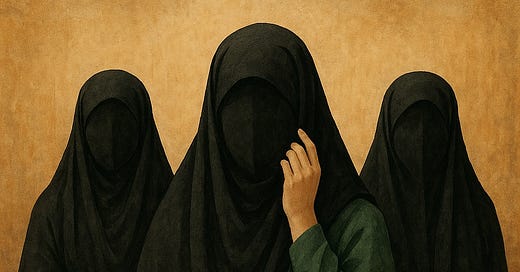Mukhtāl: Narcissism as Viewed from the Qur’an
What Allah does not love in us is exactly what we are told to cultivate in modern life.
There’s a word the Qur’an reserves for a particular kind of spiritual sickness—mukhtāl (مُخْتَال). It’s not just arrogance. Not just ego. It’s the specific posture of a person who imagines themselves as something lofty, and then acts accordingly. It’s delusional self-elevation—conceit that lives not just in the heart, but in performance.
Allah says, unequivocally:
“Truly, Allah does not love every self-conceited boaster (mukhtāl fakhūr).”
(31:18, also 4:36)
Now, that’s a frightening thing. Because not being loved by Allah is not neutral ground. It’s active disfavor. And when the Qur’an repeats something, it’s rarely about an obscure detail—it’s about a pattern in the soul that we are all vulnerable to, whether we admit it or not.
Mukhtāl comes from the root خ-ي-ل (kh-y-l), which means to imagine, to form an illusion, to put on a show. It’s the same root as khayāl—fantasy. So this isn’t just a prideful person. It’s someone who has imagined themselves into greatness, and lives inside that image. They aren’t grounded in truth. They’re inflated by illusion.
And the irony? That’s basically the psychological profile of a narcissist.
We call it “confidence” or “branding” today. But the Qur’an sees through the costume. The mukhtāl doesn’t merely think highly of themselves. He constructs a performance around that imagined superiority—one that seeks recognition, demands applause, and insulates itself from truth.
He walks on the earth as if he owns it. He demands space in every room. He is allergic to criticism and drunk on attention. And when truth comes knocking—he’s too busy being seen to ever hear it.
Narcissism and Mukhtāl: Not Just a Mirror, but a Warning
Modern psychology gives us the term “narcissism,” drawn from Narcissus who fell in love with his own reflection. But the Qur’an gives us something deeper—it doesn’t just describe the symptom; it names the spiritual condition, and it tells you what it does to your soul:
It separates you from Allah’s love.
Mukhtāl isn’t just a trait—it’s a barrier. The Prophet ﷺ said that no one who has even an atom’s weight of arrogance will enter Paradise. Why? Because arrogance contradicts servanthood. And mukhtāl is arrogance wrapped in illusion—an entire identity based on delusion.
This is why it often appears in the Qur’an next to fakhūr—the outward boaster. Because the inner illness (mukhtāl) fuels the outward display (fakhūr). You imagine your greatness, then you advertise it. You live in a house of mirrors, and convince others to live there too.
The Spiritual Psychology of Illusion
Mukhtāl is what happens when a person starts performing their ego. They aren’t content with being seen as competent—they must be seen as superior. They aren’t seeking God’s gaze—they are caught in imagining how others see them.
And here’s the terrifying part: they may not even know they’re doing it. Because illusion doesn’t just deceive others. It deceives you first.
The mukhtāl is sincere—in his delusion. He really believes his own press. And that’s what makes it so dangerous. How can you repent of a self you’re proud of?
What the Qur’an Calls Us To Instead
The opposite of mukhtāl isn’t just humility. It’s truthfulness—with oneself, with God, with the world. The opposite of khuyalāʾ isn’t self-loathing—it’s rootedness in reality, in being a servant, in refusing to perform what isn’t truly there.
The Qur’an doesn’t tell you to disappear. But it does tell you: don’t pretend. Don’t amplify your image. Don’t stand above others with illusions in your heart. Walk with dignity, not with delusion.
Because if God doesn’t love the mukhtāl, then no amount of applause, likes, or followers is going to matter. The performance will end. The mirror will crack. And you’ll be left with whatever truth you refused to see.
May God strip us of illusion before He strips us of time.
Let us not be among the self-enchanted, but among the self-aware.
And let us remember this:
The servant of his self-image is never free.
Dr. AL Finch




